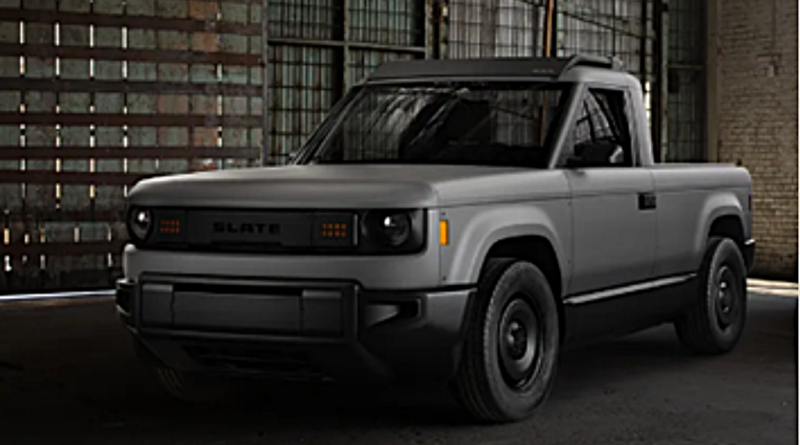Slate Auto’s Affordable, Modular Electric Truck
Article courtesy: SoftpageCMS.com
In an electric vehicle market dominated by premium offerings, Slate Auto, a new startup backed by Amazon founder Jeff Bezos, is charting a different course with the introduction of its inaugural vehicle, the Slate Truck. Promising a base price under $20,000 (after federal tax incentives) and featuring an innovative modular design, this new entrant aims to make electric mobility accessible to mainstream consumers.
Back to Basics: Affordability Over Luxury
Unlike most electric vehicles that emphasise technological sophistication and premium features, the Slate Truck embraces simplicity. The entry-level model features manual windows, steel wheels, and basic amenities—deliberately eschewing the high-tech gadgetry that has pushed many electric vehicles beyond affordability for average consumers.
“We’re focused on democratising electric transportation,” said Emma Chen, CEO of Slate Auto, during the vehicle’s unveiling event. “Not everyone needs or wants a vehicle packed with screens and sensors that they’ll never use.”
The truck offers a modest but practical 150-mile range, sufficient for daily commuting and local trips, according to US Department of Transportation data showing that approximately 95% of daily passenger vehicle trips fall under 30 miles.
Modular Innovation: The Flat-Pack Approach
Perhaps the most revolutionary aspect of the Slate Truck is its modular architecture. The company has developed what it calls a “flat-pack SUV conversion kit,” allowing owners to transform their pickup truck into an enclosed SUV within hours using basic tools.
This approach draws inspiration from the furniture industry’s flat-pack revolution and appears to be the first application of this concept in modern automotive manufacturing. The conversion kit is expected to retail for approximately $3,500, significantly less than the typical price difference between pickup and SUV variants from traditional manufacturers.
Automotive customisation experts suggest this could represent a significant shift in how vehicles are produced and marketed, potentially reducing manufacturing complexity while increasing consumer flexibility.
Production Challenges Loom
Despite the promising concept, industry analysts have identified several potential hurdles for the fledgling manufacturer. Chief among these concerns is Slate’s heavy reliance on Chinese-manufactured components, which could be affected by evolving international trade policies and tariffs.
“The sub-$20,000 price point is achievable only with current supply chains intact,” explains Dr Marcus Wei, automotive economist at Cambridge University. “Any significant trade restrictions could force a substantial price increase or necessitate rapid supply chain restructuring.”
Additionally, safety certifications for user-installed components present regulatory challenges. While Slate insists its conversion kits will meet all National Highway Traffic Safety Administration requirements, the self-assembly nature of these components enters relatively uncharted regulatory territory.
Manufacturing Strategy
Unlike many EV startups that have struggled with production ramp-up, Slate Auto appears to be taking a measured approach. The company has retrofitted a former furniture manufacturing facility in Tennessee, highlighting the synergy between flat-pack furniture production methods and their vehicle assembly process.
Initial production targets are modest at 15,000 units for the first year, with plans to scale to 50,000 annually by 2027 if demand materialises. This cautious approach contrasts with the ambitious projections that have plagued other EV manufacturers like Rivian and Lucid in recent years.
Market Positioning and Consumer Response
Market researchers suggest Slate’s no-frills approach could resonate with practical-minded consumers, particularly in rural and suburban areas where electric vehicles have seen slower adoption rates.
“There’s a significant segment of the market that wants electric propulsion without the accompanying tech premium,” notes consumer analyst Priya Sharma from J.D. Power. “The question is whether Slate can deliver adequate quality and reliability at this price point.”
Early consumer feedback from preview events has been cautiously positive, with potential buyers particularly enthusiastic about the modularity concept. However, concerns about long-term durability and parts availability remain common among prospective customers.
The Road Ahead
As Slate Auto prepares to begin deliveries in early 2026, the automotive industry will be watching closely to see if this stripped-down, modular approach represents a viable alternative path for electric vehicle development.
Should Slate succeed in meeting its price targets while delivering acceptable quality, it could force established manufacturers to reconsider their predominantly premium-focused electric vehicle strategies. This might ultimately accelerate EV adoption among price-sensitive consumers who have thus far remained on the sidelines of the electric revolution.
With backing from Jeff Bezos, whose Amazon transformed retail through similar principles of accessability and modularisation, Slate Auto certainly has the financial resources to weather initial challenges. Whether it can translate this support into manufacturing excellence and market acceptance remains the crucial question for this innovative automotive startup.
We’d love your questions or comments on today’s topic!
For more articles like this one, click here.
Thought for the day:
“Doubt kills more dreams than failure ever will.” Suzy Kassem



